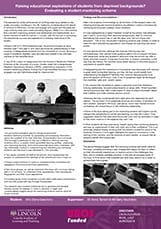By Elena Gaschino //
 The educational under achievement of working-class boys remains a key public and policy challenge in the UK, fuelled by anxieties about the failure of schools to effectively connect and engage with pupils and the particular ways working class boys resist schooling (Ingram, 2009). In response to this wider national issue, a student-mentoring scheme, piloted in the 2017-2018 academic year, and focusing on working-class boys, was established by a senior member of staff at a school in Lincoln. The aim of the mentoring scheme was to promote the educational aspirations and successes of these boys. Volunteer undergraduate students from the University of Lincoln were recruited and trained to act as mentors for the boys taking part in the scheme.
The educational under achievement of working-class boys remains a key public and policy challenge in the UK, fuelled by anxieties about the failure of schools to effectively connect and engage with pupils and the particular ways working class boys resist schooling (Ingram, 2009). In response to this wider national issue, a student-mentoring scheme, piloted in the 2017-2018 academic year, and focusing on working-class boys, was established by a senior member of staff at a school in Lincoln. The aim of the mentoring scheme was to promote the educational aspirations and successes of these boys. Volunteer undergraduate students from the University of Lincoln were recruited and trained to act as mentors for the boys taking part in the scheme.
Through UROS, I was given the opportunity to work as part of a research team, tasked with evaluating the student-mentoring scheme, in order to establish whether it had benefitted the boys it had engaged, but also to identify areas of improvement. Being a mature student, and having returned to education after a successful career as a recovery practitioner, I was keen to undertake this project. I hoped that I would gain valuable knowledge and skills that would aid me in the next two years as an undergraduate student, but also the skills and understanding required for primary research projects, which will support my ambition to study at post graduate level.
The research was not without its challenges, but these were easily overcome with great communication and team work, between myself and my supervisors Dr Anna Tarrant and Mr Gary Saunders (School of Social and Political Science), and with the support of senior staff members from the school. The project gave me experience in conducting semi structured interviews, and also provided important insights into the student-mentoring scheme, from the perspective of the staff members, the student mentors and the boys it engaged. Having no experience of working with young people, I worried that the focus group interviews with the boys would be challenging. I was also concerned that I would not be able to gain an understanding of mentees’ experiences, but after receiving some advice from a fellow student, I was able to concentrate on these interviews as well, with a good level of success in gathering information. The study produced some valuable insights. Some of the students felt they were being “heard” during their mentoring sessions, and saw an improvement in their own work and their confidence. Based on the findings we are recommending to the school that mentors are given more structure in how they run the sessions, and that the boys are able to share more about their personal interests and hobbies in order to develop trusting relationships. There is clearly a role for schools to support these boys with their educational aspirations, and to respond to how they resist their schooling. Mentoring is just one way in which this can be achieved, and can only work as part of a more holistic approach.
From the outset of this project I have learnt how to work with research partners, review literature, write an ethics form, conduct research, analyse qualitative findings and write a research report and a blog. I have learned a lot and have grown in confidence. My knowledge and understanding of the challenges faced by boys from a working-class background has also grown, giving me further understanding of societal issues including social mobility and gender identity, which I know will benefit me in my future studies and career.
*To view Elena’s project poster, please click on the thumbnail below:
